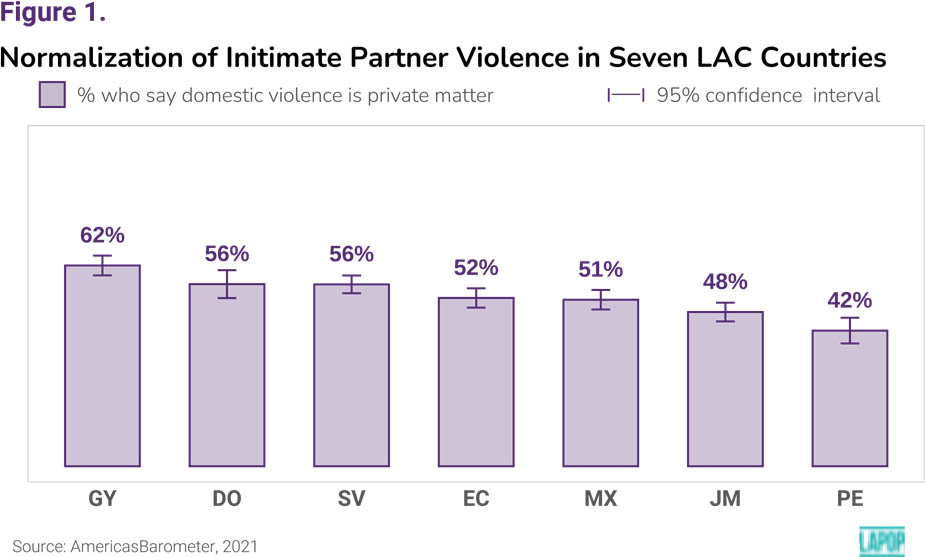Almost 62 percent of Guyanese normalize intimate partner violence (IPV) and agree that physical violence between couples is a private matter which should be handled by the couple themselves or their families, according to a Latin American Public Opinion Project (LAPOP) report.
In the May 3, 2022 report which is titled “Socialization matters more than the circumstances in predicting the normalization of intimate partner violence in the America”, Guyana has the highest percentage of agreement with keeping IPV in the private realm of the seven countries in the Americas surveyed.
The Dominican Republic, El Salvador, Ecuador, Mexico and Jamaica have intermediate levels of acceptance that are closer to the average 52% while Peru has the lowest rate of agreement of 41%.
LAPOP, run by US University Vanderbilt, conducts the AmericasBarometer survey every two years in what has been described as a scientifically rigorous comparative study. The survey measures values, behaviours, and socio-economic conditions in the Americas using national probability samples of voting-age adults.
Researcher Daniela Barba, Ph.D., found that those who hold authoritarian beliefs and identify as male are more likely to normalize IPV or see it as a private matter, whereas education and wealth are highly associated with lower normalization of IPV. The researcher relied on data from the 2021 AmericasBarometer survey.
“Education has the largest predicted effect on attitudes towards IPV: more educated individuals are 24 percentage points less likely to normalize IPV (i.e., more likely to see it as a matter that merits the public attention)…….. Similarly, wealthier individuals are 7 percentage points less likely to view violence within the couple as private,” researchers found.
“On the other hand, circumstantial factors such as wealth (holding education constant) and being in a relationship may increase stress and opportunities for conflict, leading to higher chances of and the normalization of aggression within the couple. As a circumstantial factor, poverty or lack of wealth might create conflict and stress, which then may translate in violence within the household, inflicted by men who seek to assert control or cope with stress,” they added.
In the findings of the report, the survey found that those reporting relatively more food insecurity are more likely to normalize IPV.
The research was also able to establish that the COVID-19 pandemic-induced food insecurity and health-related stress are not significant predictors of normalization of IPV.
“Age, having an intimate partner and being affected by COVID-19-related stressors have no statistical significance with respect to seeing IPV as an issue that the public should attend to. The results suggest that circumstantial factors— feeling economic or safety/health threats in connection to COVID-19 or having an intimate partner—are not per se substantially associated with attitudes that enable IPV,” the researcher concluded.
Instead, they said the evidence presented in the report points to the relevance of beliefs about power and authority and of other factors that are associated with socialization: gender, education, socioeconomic status and—and the country-level—structural improvements in gender equality”.
This Insights report has been made possible by the support of the American People through the United States Agency for International Development (USAID) and Vanderbilt University. The contents of this Insights report are the sole responsibility of its author and LAPOP and do not necessarily reflect the views of USAID, the United States Government or any other supporting organization. LAPOP’s AmericasBarometer surveys are supported predominantly by USAID and Vanderbilt University.
Domestic violence remains a major problem here despite interventions at various levels.





